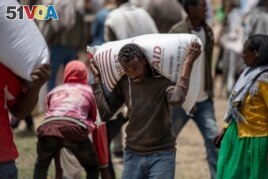16 June 2021
In the northern Ethiopian region of Tigray, more than 350,000 people are facing starvation.
It is not just that people are starving; it is that many are being starved. Farmers, aid workers and local officials confirmed to The Associated Press that food has become a weapon of war.
The AP found Ethiopian and Eritrean soldiers in the war-torn area blocking food aid and even stealing it. Reporters saw Ethiopian military officials turn away food and medical aid as fighting continued in the town of Hawzen.
The soldiers are also accused of preventing farmers from harvesting and stealing seeds for planting. Tigray people say soldiers have killed farm animals and stolen equipment.

An Ethiopian man carries a sack of wheat on his shoulders to be distributed by the Relief Society of Tigray in the town of Agula, in the Tigray region of northern Ethiopia, on Saturday, May 8, 2021. (AP Photo/Ben Curtis)
More than two million of Tigray's six million people have already fled, unable to harvest their crops. Those who stayed often cannot plant new crops because they fear for their lives.
The war in Tigray started in early November, shortly before the harvest season. On one side of the war are troops loyal to the expelled leaders of Tigray. On the other are Ethiopian government troops, and allied troops from neighboring Eritrea. Militias from Ethiopia's Amhara ethnic group who see themselves as rivals to the Tigrayan militias are also involved. Trapped in the middle are civilians.
The war has produced mass killings, gang rapes and the widespread expulsion of civilians from their homes. The United States has declared the events in western Tigray an "ethnic cleansing."
Ethiopia's government strongly disputes that starvation is being used as a weapon. Mitiku Kassa is an official with the National Disaster Risk Management Commission. He claimed Wednesday that, "We don't have any food shortage."
But that is not what the AP found in Tigray.
Teklemariam Gebremichael said he and his neighbors were no longer allowed to farm. He said Eritrean soldiers came to him while he was looking after his cows and harvesting crops. They shot both him and his cows.
He survived, but the animals did not. With food in limited supply, his wound is healing slowly.
The "world has to take immediate action to help Tigray, because we can't live on our own land anymore," he said.
Witnesses say soldiers have taken other measures to destroy food. An aid group official said Eritrean soldiers mix grain with sand and soil, making it impossible to eat. Farmers said soldiers have also taken their farming equipment.
"All our farm tools, including plows, were looted and taken away on trucks," said Birhanu Tsegay, a 24-year-old farmer. "They left nothing there."
Sometimes food aid is still delivered, but there is never enough. Early in May, a large crowd came to Agula to receive 15 kilograms of wheat, half a kilogram of peas and some cooking oil — per person. It was supposed to last a month. The food was only for the most vulnerable.
Sixty-year-old Letebrhan Belay walked for four hours to get there.
She said she has a family of 10 but received food for just five. She still said she was doing better than others.
"There will be people dying of hunger," she said.
I'm Dan Novak.
Rodney Muhumuza reported this story for The Associated Press. Dan Novak adapted it for VOA Learning English. Susan Shand was the editor.
___
Words in This Story
rival— n. a person or thing that tries to defeat or be more successful than another
loot – v. to steal things from (a place, such as a store or house) during a war or after destruction has been caused by fire, rioting, etc.
vulnerable – adj. easily hurt or harmed physically, mentally, or emotionally













